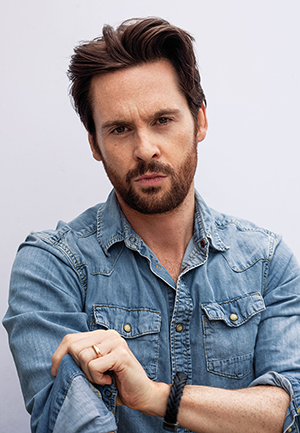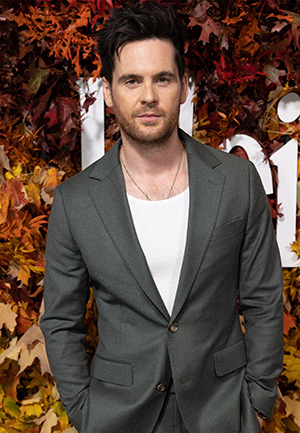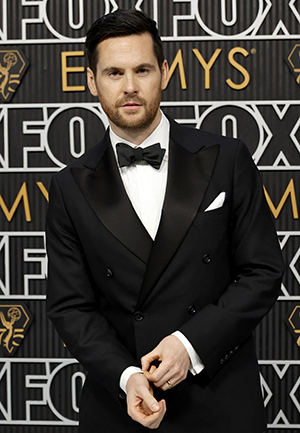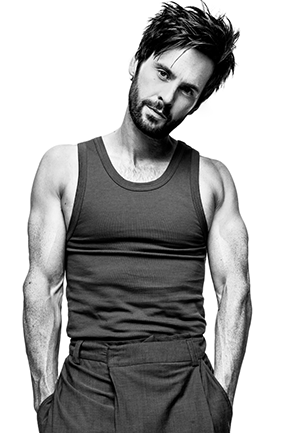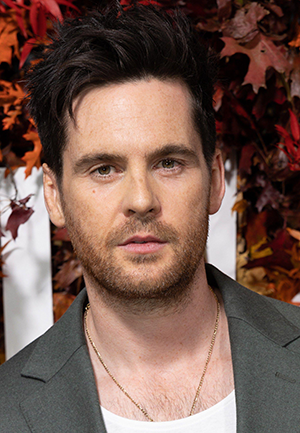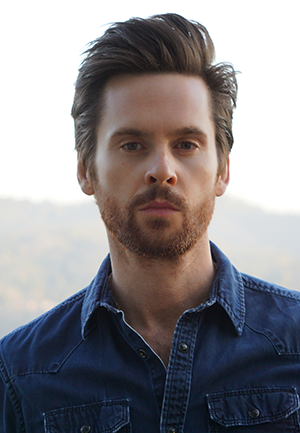A new interview with Tom discussing season 2 has been posted by Showbiz Junkies. Read it in full on that site.
How would you describe the tone of season two? Is it darker than season one?
Tom Riley:“I think, well, it certainly deals with a bigger theme and gets deeper and grittier. It’s kind of the thing that people say is the standby explanation for any sequel is, ‘Oh, it’s darker!’. I mean, it does still have its moments of lightness, don’t get me wrong, but it does have more entertaining, fun characters and there are still moments of light amongst all the darkness. But they’re going on a crazy journey and it kicks off where we left off, which was such a sort of twisted darkness anyway that we have to sort it out.”
Is there anything about how you approached Leonardo in the first season that you wish you would have approached a little differently, given where they do take him this season?
Tom Riley: “No, because I always knew where he was going so it was a case of trying to sort of measure out him as a man and how he would change over the different seasons and into the next season, if we get another one. It was always about maturing him from a cocky little arrogant individual into the man that we all know from history. So I don’t know if I would have done anything particularly different because a lot of it sort of informs how he behaves in the second season and as a result he crashes to earth. You always watch what you do in a performance and go, ‘I should have or shouldn’t have done that,’ and, ‘Oh look at that stupid face!’ But as far as character choices are concerned, no, everything they’re referencing was in the script.”
Do you prefer knowing from the start of episode one, season one, where he’s going to be in season three or season four, if that comes along?
Tom Riley: “I like the ability to mete out how you’re going to behave and what you’re going to do in a way that’s sort of steady and sensible and grows slowly for the audience, rather than thinking, ‘I’ve got to do everything at once in case we don’t get another season.’ I like that. I don’t always want to know everything, because part of the joy of doing a project like this is picking up the next script for the next episode and going, ‘Oh my God! What? We’re where?’ And that happens just as much as anything else. So it’s half and half. I like broad strokes. ”
Do you ever pick up a script and say to yourself, “How in the hell did he put these clues together?”
Tom Riley: [Laughing] “Yeah, of course. A lot of the stuff that we’ve done in the show is stuff that he has figured out; it’s stuff that really genuinely he did work out. Occasionally, there is stuff that we add in. I don’t know how much you’ve seen of the second season.”
Four episodes.
Tom Riley: “Well in about the fourth episode, he works something out that wasn’t something that he is known for having discovered. But there is no reason that he wouldn’t necessarily have worked it out, and that’s just not something that’s lost to history. We did a similar thing in season one with Continental Drift and he works out the shape of the country and discovered it must have been broken off from another country. It wasn’t actually Leonardo who worked that out, but it’s not too big a stretch to think he might have done. So actually, I’m more stunned by what the real man put together in his head than what the fictional version of him that we have, did.”
Did you know a lot about Da Vinci before you took on the starring role in Da Vinci’s Demons?
Tom Riley: “I just knew the general strokes. It was a period in history that isn’t really taught in American schools or English schools. If anything is taught, it’s in art and you learn about his brush strokes and you learn about how he influenced artists. You never learn of the Medici family or any of that stuff, so I never really knew what he was like as a man. So it’s been that that was the education, discovering what he was like as a 20-year-old and building that foundation based around the fact that everything I read says he was anarchic, and anti-authoritarianism and could be difficult to be around, a troublemaker and borderline autistic and all that stuff. I thought, ‘I never learned this in school. I just happened to know that he could draw with both hands.’ That was the stuff that really enlightened me. It was all the character stuff.
I would imagine that playing a historical figure like this who is known more for his later years in life and where most people have no idea what he was up to as a 25 year old is slightly easier than playing him at a later age, isn’t it? You don’t have quite as many expectations to satisfy.
Tom Riley: “Well, I’d argue that the problem is when you play someone like this who’s been mythologized for the rest of his life, that he is frozen in people’s minds at a certain age and so the moment you start presenting him at a different age behaving in a way that they don’t have in their mind, then that can be quite abrasive to an audience. ‘How dare you do this to the legend, the man?’ He was wise, he was sage, he left behind this incredible body of masterpieces…He can’t possibly have been like that.’ But it’s fun to show the journey. It’s fun to do it but I think, originally, and I knew when we did those first three episodes, I said to myself, ‘This particular image is going to jar. It’s going to take a little while to get people to go, ‘Oh, okay, okay, that’s what this is,’ and then get on board with it and watch him change. So in theory I thought it would be easier. In actuality, I forgot how passionate art historians are.”
You also have to play him with this mix of borderline madness and genius. You have to walk this fine line where you can’t let him go too far. You can’t let him sink into that total madness. How do you do that?
Tom Riley: “Well the main thing that I always hang on it is that he has to appear relatable at all times. Because so much of the story is seen through his eyes, somehow you’ve got to make the greatest genius that the world has ever known and someone that general person watching at home can identify with. That was always the toughest thing. That was what I always held front and foremost in my mind. It was that he was a man who was dealing with the greatest mind in history, but he was also dealing with the everyday issues that that brings up and the everyday issues that he does in his relationships. So that was what I always clung to.”
He has a very complicated, love life. Are we going to see much more of that explored in this next coming season? Is he going to be happy?
Tom Riley: [Laughing] “Is he going to be happy? I can tell you no. His constant struggle for perfection made it impossible for him. I don’t think he’ll ever be happy until he has worked out every last problem the world has to offer him. As far as his love life is concerned, I think he just needed a life and he is curious with various people of various sexes. And certainly Lucrezia has played heavy on his mind, because they are two very similar characters who both are following a single-minded mission, just on different sides of the boat. I don’t know if it will be sorted out this season – put it that way.”
Speaking of Lucrezia, you and Laura Haddock have amazing chemistry.
Tom Riley: “Well, thank you. Yeah, we get on. She’s a good friend. Thank god she’s a good friend or things would be awkward!”
And talking about awkward scenes, how difficult is it filming some of these episodes? I’m thinking about the scene where you are standing in front of a guy strapped to a pig.
Tom Riley: [Laughing] “Oh yeah, that scene. There’s a funny story about that scene. That guy, he hadn’t read the script when he auditioned. He pretended. You do that thing when you’re an actor. You go in, he’s a lovely actor, very well respected in England, but you do that thing, where you go, ‘I’m going to go in and do a bit part in the show and I don’t really have time to read the script, so I’ll read my scenes and I’ll go and do the audition.’ He went and did the audition, and after he had done it, the director loved him and sat him down and said, ‘Okay, so tell me how do you feel about being strapped to the pig? It’s going to be very friendly.’ To which the actor went, ‘Yeah, no, fine, fine,’ thinking, ‘I don’t know what you are talking about.’ And then he ended up going to the set, and I’ll tell you what. He was so good with the pig that he spent lunch break with it. He sat around with it stroking its back, learned its name and by the time we were all sitting together in the room, we were all friends, including the pig.”
You also did a whole episode with Dracula, which I’m sure you weren’t expecting when you were cast as Leonardo.
Tom Riley: “No, you don’t expect that, but that’s the thing with David [Goyer]. He found out that, quite realistically, Vlad Draco was around at the same time that Leonardo was and that their paths could feasibly have crossed. It would have been a bit of stretch, but they could have crossed. So we just thought, ‘Should we try it?’ It’s a show that does deal heavily in the fantastical. We’ve said that from the beginning that this is a historical fantasy and being on this course will be having some crazy, fantastical stuff. So Vlad seemed like such a great character from history that we should definitely use him. So we did, and Paul Rhys was brilliant.”
I know you can’t give away anything, but can we expect more surprises like that in this coming season?
Tom Riley: “I think there is going to be a lot of surprises like that this season. The fact that we no longer stay in Italy, it leaves itself open to everything. And, trust me, everything comes.” That kind of sounds like a threat and a promise. Talk about working with David Goyer because the man knows how to write a script. Tom Riley: “I love David. We get on so well. He’s become a really good friend as well as a colleague. It doesn’t feel like you work for him; it feels like you work with him because he’s so collaborative with it all. He loves a great idea. He gets very seduced by a great idea. He is just a machine, just constant ideas. Every time he sits down for lunch, he goes, ‘Okay, I’ve had this idea for season four.’ And you think ‘What the hell? Why are you thinking about that now?’ He is just so on top of it all and it’s great. It’s infectious, that kind of natural energy. It works it way down from the top, all the way through the crew.”
But when he has something planned out all the way through season four, doesn’t it kind of alter the collaborative process because you may be thinking something different for the current season, yet he already has a path laid out through season four? Can you still ask if Leonardo could do something different than is scripted?
Tom Riley: “I think so, yeah, because I’m safe in the knowledge that if he doesn’t like it, it won’t happen. We all get a chance to say, ‘Will that work? Does that make sense?’ And David listens and agrees or disagrees and we tend to go with what he feels and what his writers feel.”
Is there anything in particular you can point out that you suggested that David actually adopted?
Tom Riley: “I’m trying to think… There’s a bit – I was thinking that someone else did it to take it off my shoulders – but I think there was a bit in the very first episode where the Turk appears in the bar in season one. And it is all very odd and it has to finish with Gregg Chillin saying, ‘That was strange,’ and/or ‘What was that about?’ And in one of the takes, it finished and the Turk did his strange thing and then Gregg says, ‘Bit weird.’ And it was such a sort of a strange moment, such a weird, modern, contemporary moment, David just fell out from behind the monitor, ‘That’s staying in. It’s ridiculous. That’s staying in.'”
I can’t even imagine what the sets are actually like. Are they as incredible as what we think they must look like?
Tom Riley: “Yeah. They’re huge. Two hundred sixty thousand square feet. It’s just sound stage upon sound stage. When one sound set is being worked on, another one is being built. And you know this season we go all over the world, so you literally, you travel from continent to continent as you walk through the same building, this old floor factory off of the highway in Wales. It’s an incredible building to be in actually. So many people worked on it, hundreds and hundreds and hundreds.”
You’re playing a man who’s a genius but who also has impressive fighting skills. How do you handle that? What do you do to get yourself prepared?
Tom Riley: “Well, there’s a lot of gym stuff and a lot of working out and eating well, making sure that you’ve just got the stamina to get through days like that. But also, in the first series, he did have some super human powers, but I think it in the second season there’s only so far you can push an audience by going, ‘Hey, this guy can so anything.’ I was always very adamant that we should see him getting beaten. We should see other people who are better than him at things, who can best him. There are people out there. He can’t be the best in the world at everything. So this season he’s going to discover that actually, despite that he may believe that he is the greatest swordsman, greatest fighter, the greatest artist the world has ever seen, there might be other people out there who can teach him a thing or two.”
That’s strange that an actor would say, “Hey, don’t make my guy the best at everything.”
Tom Riley: “Oh no, I love it. I love that stuff. It’s very tough to ask an audience, convince an audience to like a guy who is good at everything. Vulnerability is something that I think actors get scared of and they don’t want to show it because it reveals so much of themselves. I like to say, ‘Well what happens if he gets broken? What really gets to him? What will change this man and make him reevaluate the world and stop thinking he is the center of it?’ I like that stuff.”
Speaking of the audience, were you surprised by how it was embraced and the ratings for the show and the fact that it did get renewed for season two?
Tom Riley: “Yeah, we were kind of blown away. I mean, when we started it, we knew we were doing a British / American co-production, but at that point, it hadn’t been sold around the world to the 150 countries that it is. It hadn’t been sold to Japan and the Middle East and to France and Israel and Germany and Australia. We just didn’t expect that, and it’s been very odd being in London and being chased by tourists from Turkey. It’s the worldwide appeal that we just didn’t see coming. And doing the second season knowing that it is going to be shown in 160 countries or whatever, it’s a little more intimidating than the first season was because we just thought we were making a little show for ourselves and our parents.”
